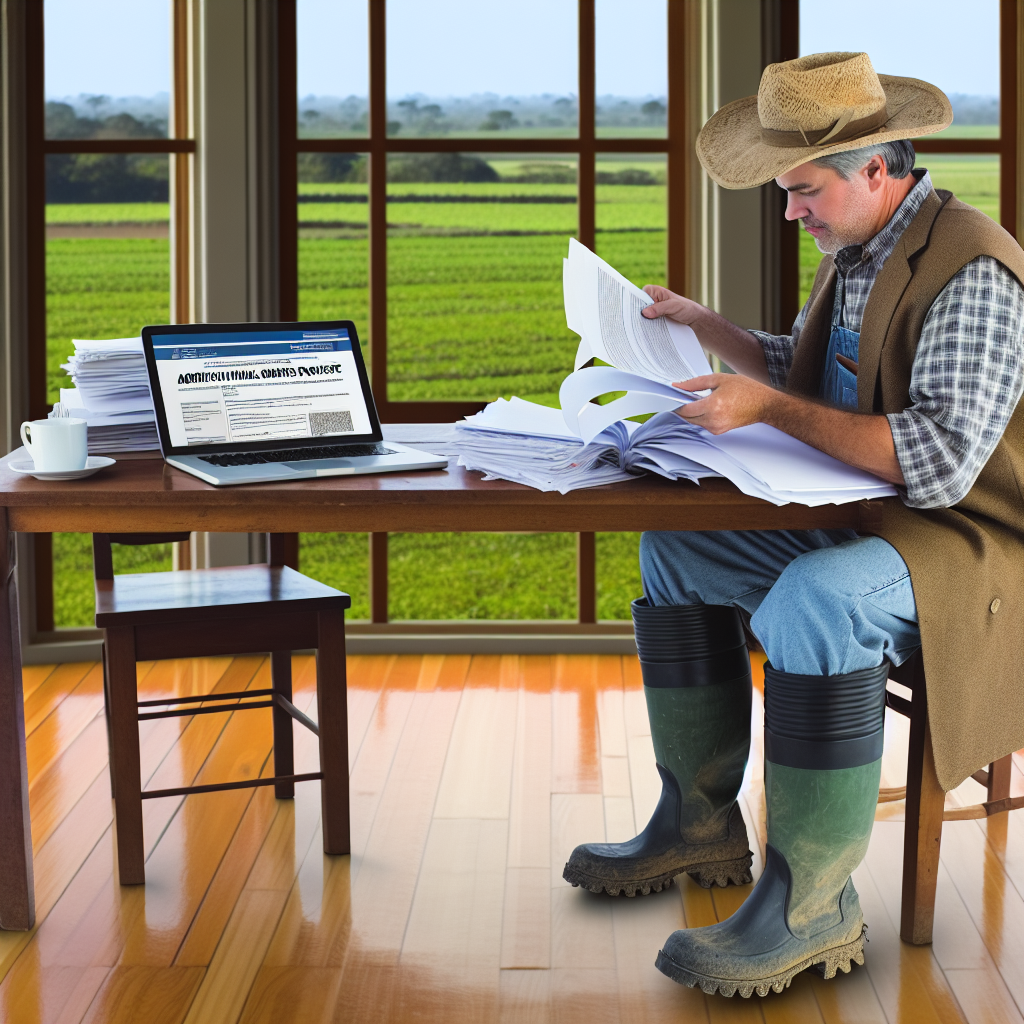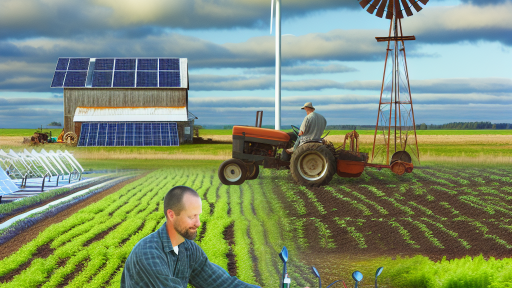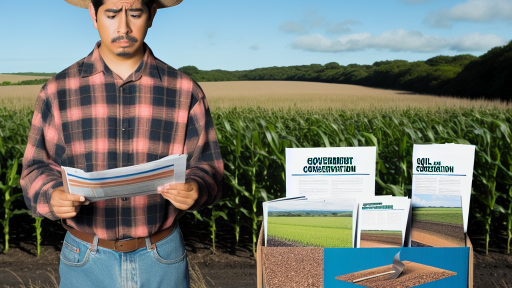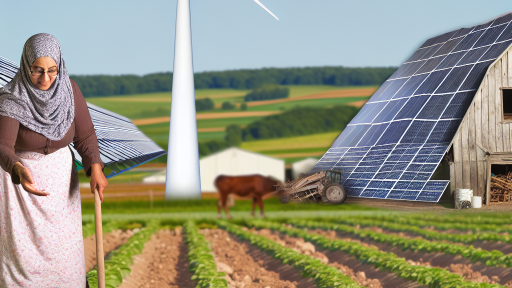Understanding the Importance of Agricultural R&D
Driving Innovation in Agriculture
Agricultural R&D fosters innovation in farming practices.
This innovation leads to improved crop yields and pest resistance.
Farmers can adapt to changing climate conditions effectively.
Moreover, R&D enables the development of sustainable farming techniques.
Boosting Economic Growth
Investing in agricultural R&D spurs economic growth.
It creates jobs in research, development, and farming sectors.
Additionally, increased productivity enhances farmers’ income.
When farmers thrive, local economies benefit significantly.
Enhancing Food Security
Agricultural R&D plays a vital role in food security.
It addresses global challenges like population growth and resource depletion.
Research efforts focus on developing resilient crops.
Such crops can withstand pests and climate extremes.
Promoting Environmental Sustainability
Investments in agricultural R&D promote environmental sustainability.
Research leads to practices that conserve water and soil quality.
It encourages the use of organic and less toxic pesticides.
Transform Your Agribusiness
Unlock your farm's potential with expert advice tailored to your needs. Get actionable steps that drive real results.
Get StartedThe aim is to reduce agriculture’s carbon footprint.
Encouraging Collaboration and Partnerships
Agricultural R&D encourages collaboration among stakeholders.
Farmers, government agencies, and researchers unite for common goals.
This partnership strengthens knowledge transfer and technology adoption.
As a result, farmers access advanced tools and techniques faster.
Overview of Government Grants for Farmers
Government grants play a vital role in supporting agricultural innovation.
These funds are designed to enhance research and development projects.
Farmers can access various grant programs at local, state, and federal levels.
Each program has unique eligibility requirements and funding opportunities.
Types of Grants Available
Farmers have access to several types of grants for R&D initiatives.
Research grants focus on innovative agricultural practices.
Development grants support projects that aim to implement new technologies.
Furthermore, some grants also promote environmental sustainability.
Eligibility Criteria
Eligibility for government grants depends on several factors.
Farmers typically need to meet specific criteria set by grant programs.
These criteria may include farm size, location, and type of crops grown.
Additionally, some grants require farmers to demonstrate their project’s innovation.
Application Process
The application process for government grants can be detailed.
First, farmers should identify relevant grant opportunities.
Next, they need to gather necessary documentation, such as farm records.
After compiling documents, farmers must complete the grant application.
Timely submission is crucial to ensure eligibility for funding.
Advantages of Accessing Grants
Accessing government grants brings multiple advantages to farmers.
Grants can alleviate financial burdens associated with R&D projects.
Showcase Your Farming Business
Publish your professional farming services profile on our blog for a one-time fee of $200 and reach a dedicated audience of farmers and agribusiness owners.
Publish Your ProfileMoreover, they promote experimentation with innovative practices.
This support often leads to long-term benefits and sustainable farming.
Resources for Finding Grants
Farmers can utilize various resources to discover grant opportunities.
The USDA website provides comprehensive information on available grants.
Additionally, local agricultural extension offices can offer guidance.
Networking with other farmers can also reveal grant insights.
Many non-profit organizations focus on agricultural funding as well.
Types of Grants Available for Agricultural R&D
Federal Grants
Federal grants play a significant role in supporting agricultural research and development.
The U.S. Department of Agriculture offers various grants for innovative projects.
These grants focus on improving farming techniques and sustainability.
Examples include the Specialty Crop Research Initiative and the Organic Agriculture Research and Extension Initiative.
State Grants
Many states provide grants specifically for local agricultural projects.
State departments of agriculture often have unique programs for farmers.
These grants can fund projects aimed at enhancing local ecosystems.
Additionally, they may support community-supported agriculture initiatives.
Private and Non-Profit Grants
Private organizations and non-profits also offer funding for agricultural R&D.
These grants often target specific issues within the agricultural sector.
For example, the Sustainable Agriculture Research and Education program supports sustainable projects.
Non-profit organizations frequently collaborate with farmers to drive innovation.
Grant Writing Resources
Effective grant writing is crucial for securing funding.
Farmers should consider attending workshops designed to improve grant writing skills.
Online resources are also available to guide applicants through the process.
Furthermore, local agricultural extension offices can provide assistance.
Eligibility Criteria
Eligibility criteria vary depending on the grant source.
Farmers typically need to demonstrate the potential impact of their projects.
It is essential to align project goals with the grant’s objectives.
Additionally, providing detailed budgets and project timelines is often necessary.
Gain More Insights: Maximizing Agricultural Research and Development Funding: Tips for Farmers
Eligibility Criteria for Accessing Government Grants
Understanding the Grants
Government grants are available for agricultural research and development projects.
However, not all farmers qualify for these financial aids.
Every grant program has specific eligibility criteria that applicants must meet.
Types of Eligible Applicants
Generally, both individuals and organizations can apply for grants.
Farmers must demonstrate they operate a legitimate agricultural business.
Moreover, research institutions can also qualify if they partner with farmers.
Geographical Requirements
Eligibility often depends on the geographical location of the project.
Many programs restrict funding to certain regions or states.
Therefore, farmers should verify if their area is included in the grant scope.
Project Scope and Objectives
Eligible projects typically focus on innovative agricultural techniques.
These projects should aim to improve productivity or sustainability.
Applicants must clearly outline their project goals in their proposals.
Showcase Your Farming Business
Publish your professional farming services profile on our blog for a one-time fee of $200 and reach a dedicated audience of farmers and agribusiness owners.
Publish Your ProfileFinancial Conditions
Farmers may need to demonstrate financial need for their requested funding.
Some grants require matching funds from the applicant’s resources.
It’s essential to prepare detailed budgets when applying for grants.
Experience and Qualifications
Agricultural experience significantly influences eligibility.
Applicants should have a record of experience in farming or agricultural research.
Additionally, relevant qualifications can enhance a farmer’s application.
Compliance with Regulations
Farmers must comply with all federal and state agricultural regulations.
Non-compliance may result in disqualification from grant opportunities.
Staying informed about regulations is crucial for continued eligibility.
You Might Also Like: Farm-To-Table Legislation: Ensuring Transparency in Agricultural Supply Chains
Step-by-Step Guide to Applying for Government Grants
Understanding Grant Opportunities
Farmers should start by researching available agricultural grants.
The government offers various funding options for R&D projects.
Grants can support innovation, sustainability, and productivity enhancements.
Next, determine eligibility criteria for each grant program.
Each program has specific requirements for applicants.
Preparing Your Application
Begin by outlining your R&D project objectives and goals.
A clear project outline will strengthen your application.
Furthermore, gather relevant data to support your proposal.
Include details on budget, timeline, and expected outcomes.
Be transparent about all costs associated with the project.
Writing the Proposal
Your proposal should be concise and well-structured.
Start with an engaging executive summary of your project.
Include a section detailing your project’s significance in agriculture.
Use bullet points to emphasize key aspects of your proposal.
- Project objectives
- Innovative techniques
- Expected results
Finally, review the application guidelines carefully before submission.
Submitting the Application
Ensure all required documents are prepared before submission.
Submit your application through the appropriate government portal.
Keep a copy of your submission for your records.
Be aware of deadlines to avoid missed opportunities.
Following Up
After submission, follow up with the relevant agency.
Inquire about the status of your application politely.
If awarded, be prepared to comply with all reporting requirements.
Monitoring the application’s progress shows your commitment.
Delve into the Subject: Innovations in Agricultural Insurance for Modern Farming

Common Mistakes to Avoid When Applying for Grants
Not Reading the Guidelines
Many applicants fail to read the grant guidelines thoroughly.
This oversight can lead to critical mistakes in applications.
Take the time to understand the requirements fully.
Doing so can save you significant time and effort.
Ignoring Deadlines
Keeping track of deadlines is essential in grant applications.
Missing a deadline can disqualify your application immediately.
Showcase Your Farming Business
Publish your professional farming services profile on our blog for a one-time fee of $200 and reach a dedicated audience of farmers and agribusiness owners.
Publish Your ProfileUse reminders to ensure you submit your application on time.
Submitting Incomplete Applications
Ensure that your application includes all required documents.
Incomplete applications often lead to automatic rejections.
Double-check your submission for completeness before sending it.
Underestimating Project Costs
Many applicants underestimate the total costs of their projects.
Provide detailed and accurate budget estimates.
Inflated costs can raise suspicions among reviewers.
Instead, aim for transparency and clarity in your budget.
Neglecting to Follow Formatting Guidelines
Formatting mistakes can detract from your professional image.
Review any formatting specifications outlined in the guidelines.
Proper formatting ensures readability and organization.
Not Seeking Feedback Before Submission
It’s beneficial to have someone review your application.
Feedback can highlight areas for improvement you might miss.
Consider seeking advice from experienced colleagues or mentors.
Focusing Solely on Funding
While funding is vital, your project must also demonstrate impact.
Clearly outline how your project benefits the community or industry.
This perspective can strengthen your application significantly.
Find Out More: Navigating Food Safety Policies for Sustainable Farming
Tips for Writing a Successful Grant Proposal
Understand the Grant Requirements
Start by reviewing the grant guidelines carefully.
Focus on eligibility criteria and funding priorities.
This understanding helps direct your proposal effectively.
Develop a Clear Project Plan
Outline your project objectives and outcomes clearly.
Ensure your goals align with grant priorities.
Include a timeline detailing key milestones.
Establish a Budget
Create a realistic budget that reflects your project needs.
Break down costs to justify your funding request.
Ensure your budget aligns with grant guidelines.
Demonstrate Expertise and Capability
Highlight your team’s experience and qualifications.
Showcase past successful projects to build credibility.
Include any partnerships that enhance project capabilities.
Write Clearly and Persuasively
Use straightforward language throughout your proposal.
Be concise and avoid jargon that may confuse reviewers.
Engage the reader with compelling narratives about your project.
Follow Formatting Guidelines
Stick to any specified formatting requirements.
Pay attention to font size, margins, and spacing.
Ensure all sections are organized logically and coherently.
Review and Edit Thoroughly
Proofread your proposal multiple times before submission.
Seek feedback from colleagues or mentors for improvement.
Address any comments or suggestions carefully for clarity.
Submit on Time
Keep track of deadlines and submission processes.
Showcase Your Farming Business
Publish your professional farming services profile on our blog for a one-time fee of $200 and reach a dedicated audience of farmers and agribusiness owners.
Publish Your ProfilePlan for potential delays in finalizing your proposal.
Submit your application well before the deadline to avoid issues.
Resources and Organizations to Assist Farmers in Grant Applications
Government Agencies
Farmers can access various government agencies for grant information.
The United States Department of Agriculture (USDA) offers numerous grant programs.
Local offices of the USDA can provide personalized assistance to farmers.
State departments of agriculture also have valuable resources available.
Farm Service Agencies assist farmers in navigating the grant application process.
Non-Profit Organizations
Numerous non-profit organizations focus on agricultural development.
Organizations such as Farm Aid provide financial resources and advice.
The National Sustainable Agriculture Coalition advocates for farmer-friendly policies.
Furthermore, local co-ops often offer guidance on grant applications.
Online Platforms and Tools
Multiple online platforms facilitate access to available grants.
Grants.gov is a key resource for finding federal grant opportunities.
Moreover, websites like AgFunder provide insights into agricultural funding.
Farmers can also use grant writing software for structured application support.
Networking and Workshops
Attending workshops can significantly enhance grant application skills.
Many agricultural extension offices host grant writing workshops.
Additionally, industry conferences provide networking opportunities with experts.
Farmers should join local farming associations for additional support.
Additional Resources
Investment in U.S. Public Agricultural Research and Development …




